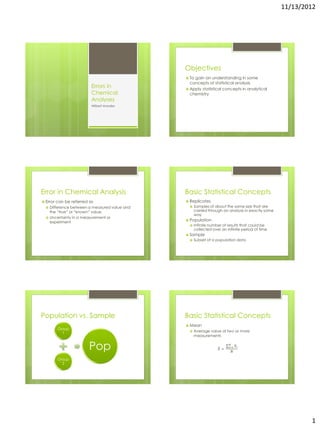Errors in chemical analyses
- 1. 11/13/2012 Objectives ’éø Togain an understanding in some concepts of statistical analysis Errors in ’éø Apply statistical concepts in analytical Chemical chemistry Analyses Wilbert Morales Error in Chemical Analysis Basic Statistical Concepts ’éø Error can be referred as ’éø Replicates ’éø Difference between a measured value and ’éø Samples of about the same size that are the ŌĆ£trueŌĆØ or ŌĆ£knownŌĆØ value. carried through an analysis in exactly same way ’éø Uncertainty in a measurement or ’éø Population experiment ’éø Infinite number of results that could be collected over an infinite period of time ’éø Sample ’éø Subset of a population data Population vs. Sample Basic Statistical Concepts ’éø Mean Group 1 ’éø Average value of two or more measurements Pop Øæŗ= Øæü Øæ¢=1 Øæü ØæŗØæ¢ Group 2 1
- 2. 11/13/2012 Example Basic Statistical Concepts SAMPLE DATA 1 ’éø Median Det. Of Fe(II) conc Mean: 19.4+19.5+19.6+19.8+20.1+20.3 %ØæØØæØØæÜ ’éø Middle value in a data that has been 19.4 ppm Øæŗ= arranged in a numerical order 6 19.5 ppm ’éø Can be used if data contain some outliers 19.6 ppm Øæŗ = 19.8 ØæØØæØØæÜ ØÉ╣ØæÆ ’éø If set contains even no. of measurements, 19.8 ppm median is the average of central pair 20.1 ppm 20.3 ppm Basic Statistical Concepts ’éø Precision ’éø Describes the reproducibility of measurements ’éø Measures the closeness of results obtained ’éø Accuracy ’éø Indicates the closeness of the measurement to the true or accepted value Types of Error in Experimental Three types of Systematic Data Errors ’éø Systematic Errors ’éø Instrumental Errors ’éø Generally arise from identifiable sources ’éø Substandard volumetric glassware causing measured value to differ from true ’éø Faulty or worn chemical components or accepted value ’éø Incorrect electrical signals ’éø The key feature of this is that the error is reproducible. 2
- 3. 11/13/2012 Three types of Systematic Three types of Systematic Errors Errors ’éø Method Errors ’éø Personal Errors ’éø Inadequate method validation ’éø Carelessness ’éø Nonideal chemical or physical behavior of ’éø Insufficient training analytical system ’éø Illness or disability Accuracy Accuracy ’éø Absolute Error ’éø Relative Error ØÉĖ = ØæźØæ¢ ŌłÆ Øæź ØæĪ ØæźØæ¢ ŌłÆ Øæź ØæĪ ØÉĖØæ¤ = Øæź 100% ØæźØæĪ ’éø Tells whether the value in question is high or low Types of Error in Experimental Data Standard Deviation ’éø Random Errors ’éø shows how much dispersion exists from the ’éø Cause the data to be scattered around the average. mean value ’éø It affects the precision of measurements Øæø Øæ¢=1(Øæź Øæ¢ŌłÆ Øæŗ )2 ØæĀ= ØæøŌłÆ1 3
- 4. 11/13/2012 Range or spread Example ’éø It is the difference between the largest Determination of glucose level of diabetic patient value and smallest value in the set. Data 1 Data 2 Data 3 Data 4 Glucose Conc Glucose Conc Glucose Conc Glucose (mg/L) (mg/L) (mg/L) Conc (mg/L) 1108 992 788 799 1122 975 805 745 1075 1022 779 750 1099 1001 822 774 1115 991 800 777 1083 800 1100 758 SEATWORK ’éø Consider the following sets of replicate QUESTION??? measurements: ’éø Next meeting Set A Set B Set C 3.5 0.812 70.65 ’éø Review of Significant Figures 3.1 0.792 70.63 3.1 0.794 70.64 3.3 0.900 70.21 2.5 ’éø Foreach set, calculate (a) Mean (c) range (b) Median (d) standard deviation Assignment ’éø Perform the following operations and observe proper significant figure. A) 30.5 ml + 16.75 ml - 0.576 ml + 2.0 ml B) 1.632x105 g + 4.107x103 g + 0.948x106 g C) (3.26x10-5 L )*(1.78 L) D) log 339 E) Antilog (-3.42) 4




